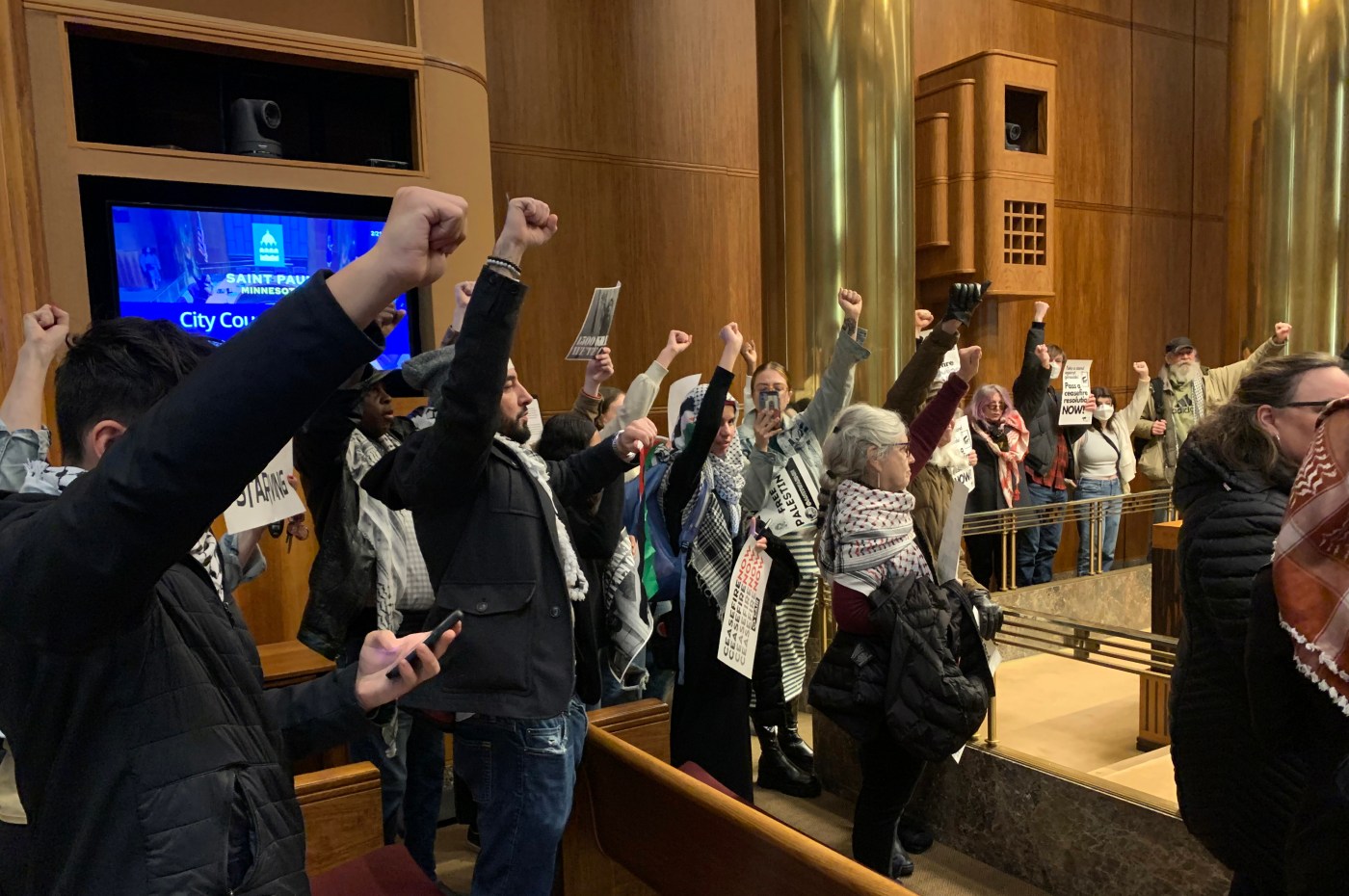
Protesters demand a ceasefire resolution. The St. Paul City Council isn’t poised to give them one.
More than once, dozens of protesters have approached St. Paul City Hall to demand a written resolution condemning Israeli military strikes on Gaza, which have left scores of noncombatants dead since October.
Upwards of 70 cities across the nation — including Hastings and Minneapolis, San Francisco, Atlanta and Detroit — have approved similar, largely symbolic resolutions intended to pressure on the Biden administration to halt military aid to Israel and call for a ceasefire. St. Paul doesn’t plan to join them.
No such resolution appears imminent in the capital city, where seven self-proclaimed progressive women were elected to the most diverse city council in St. Paul history last November. When the Anti-War Committee, Jewish Voice for Peace and other pro-Palestinian groups halted the regularly-scheduled council meeting last Wednesday with loud and persistent chanting, all but Council Member Nelsie Yang stood up and left the council chambers.
Nelsie Yang. (Courtesy of the City of St. Paul)
“As the ONLY Councilmember currently in support of a ceasefire resolution, I’m in solidarity with you all the way,” wrote Yang later on Facebook, where she posted pictures of herself posing with members of the Free Palestine Coalition. “People are dying every day in this war. We need to act swiftly and boldly to call for an end to this war and ensure that our U.S. tax dollars aren’t funding the bombing and killing of innocent people.”
Local issues
Little more than a month after being featured for their groundbreaking racial and ethnic diversity, the seven council members are now under scrutiny by activists. Some 30,000 Palestinians — most of them civilians — have died since the attacks on Gaza began.
Council members have pointed out that many — though not all — of the protest organizers come from outside the city, and the newly-elected council has its hands full introducing itself to its constituents for the first time.
Likewise, St. Paul Mayor Melvin Carter has shown no enthusiasm for pressing the council to take up the issue. Asked on Friday whether he would sign a ceasefire resolution, Carter responded, “I haven’t seen one. I try not to deal in hypotheticals.”
The mayor then indicated he was focused on local issues.
“We really, really have to make sure every St. Paul resident has housing,” Carter said.
New council
The prospect of a resolution has left City Council President Mitra Jalali — an Iranian-American advocate and ceasefire proponent — in the tenuous position. Jalali is trying to lead a new council still getting its feet wet, let alone building a rapport with a variety of community groups on Middle East peace issues.
Mitra Jalali (Courtesy photo)
The St. Paul City Council is poised to approve two resolutions on Wednesday’s agenda directing some $45 million from the city sales tax this year to Public Works and Parks and Recreation projects.
“It’s our first major action as a council,” said Jalali, during a roundtable on Friday on sales tax spending. “I view this as the first major action on the things we campaigned on.”
A majority of the council members — all but Jalali, Yang and Rebecca Noecker — were newly elected in November, and all of them are backed by liberal coalitions. The ongoing military strikes erupted after Hamas — Islamic militants designated by the U.S. State Department as a terrorist organization — led an Oct. 6 attack on Israeli territory that left 1,163 dead. Another 253 people were taken hostage.
It’s unclear if a ceasefire resolution would garner majority approval within the St. Paul council. Jalali told protesters on Wednesday she did not have the votes.
“I don’t make decisions in a vacuum,” she said, before being shouted down by protesters yelling “We want a vote!” and “St. Paul Council, you can’t hide! Help us stop this genocide!”
“You’re scared to go ahead and say what’s right, and that’s why it took decades to end segregation in this country,” shouted lead chant organizer Sabry Wazwaz, a member of the Minnesota Anti-War Committee, addressing the city council on Wednesday.
Rebecca Noecker
Noecker had the following to say about the issue:
“The city council’s policy for quite a while now has been not to pass resolutions on international issues,” she said on Monday. “We’re getting emails to pass a resolution, and not to pass a resolution. Our goal is to model respect and understanding, and bring people together, not to pass resolutions that are going to divide people and bring people a lot of pain, no matter how carefully we word them. Bullying is not a thoughtful way to make policy.”
Jalali later declined further questions on the issue. Council members Anika Bowie, Cheniqua Johnson, Saura Jost and HwaJeong Kim did not return calls for comment on Monday.
Local v. international issues
While the city council has, over the years, been no stranger to symbolic resolutions on national issues, some voters have questioned the need at the local level. The work of City Hall revolves largely around fixing streets and streetlights, hiring police and firefighters and other street corner issues funded in large part by local property taxes.
“Why don’t they fly to Tel Aviv and protest there?” wrote a social media user, responding to video of last Wednesday’s City Hall encounter on Facebook. “Disrupting city business because you are angry at something happening thousands of miles away seems about as effective as not going to work because your baseball team lost.”
Despite the lack of a written resolution, the council president has made her personal politics well known. Jalali, who is Iranian on her father’s side and has been active with the National Iranian American Council, used the occasion of the council’s swearing-in ceremony in January to make a personal plea for a ceasefire. She has previously called on the United Nations to investigate human rights abuses in Iran under the extremist regime of the Islamic Republic.
Across the river, the Minneapolis City Council recently approved a ceasefire resolution 9-3 with one abstention, and then overturned Mayor Jacob Frey’s veto of the language, which Frey had dubbed one-sided.
The Minneapolis resolution supports “an end to U.S. military funding to the State of Israel, and an end to U.S. tax dollars contributing to humanitarian catastrophe and loss of life.” It also calls for ensuring the release of all Israeli hostages taken by Hamas by Oct. 6, and ensuring “the release of thousands of Palestinians held indefinitely without cause and trial in Israeli military prisons.”


